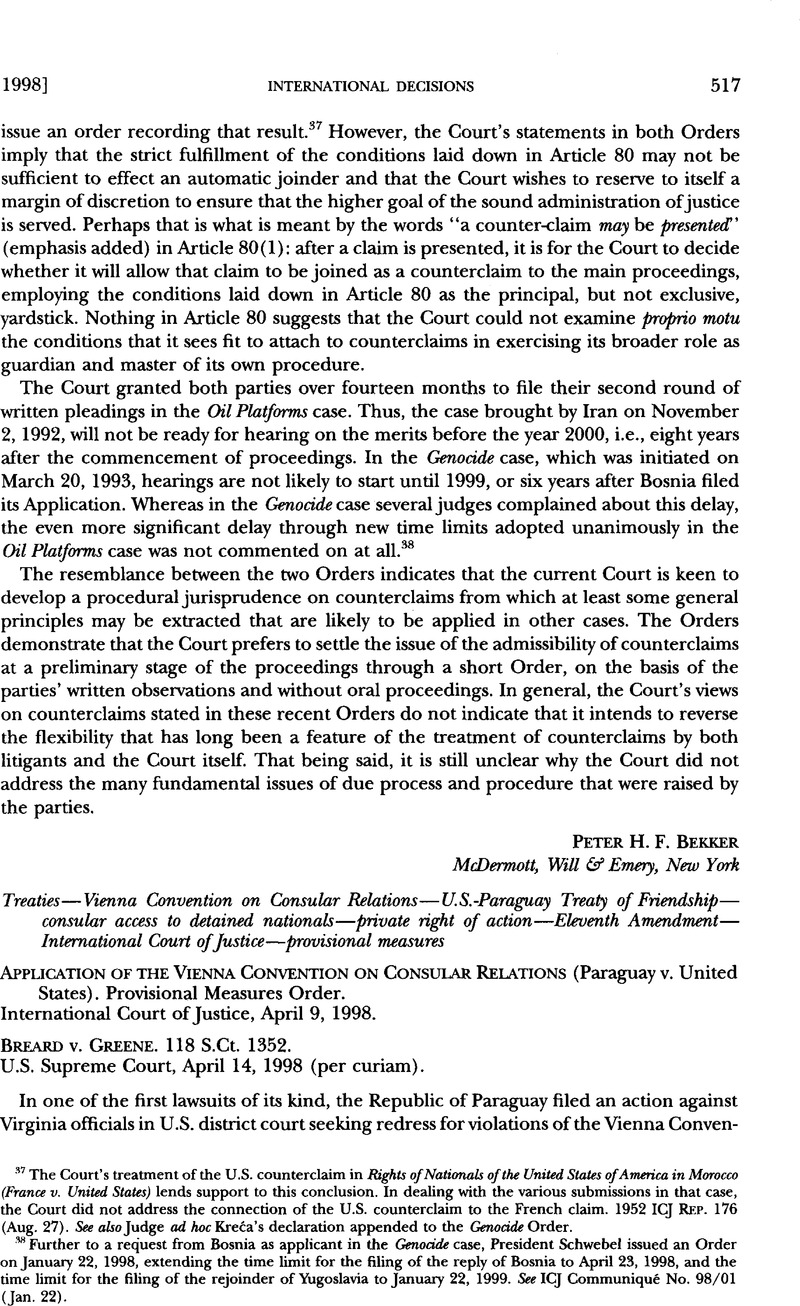Published online by Cambridge University Press: 27 February 2017

1 Convention on Consular Relations, Apr. 24, 1963, 21 UST 77, 596 UNTS 261 [hereinafter Vienna Convention] . Article 36 of the Vienna Convention provides that a detained foreign national must be informed of his right to communicate with consular officials. It also grants consular officials the right to visit with a detained national and to arrange for his legal representation.
The 1859 Treaty of Friendship, Commerce and Navigation between the United States and Paraguay contains a most-favored-nation clause with respect to consular and diplomatic agents. Treaty of Friendship, Commerce and Navigation, Feb. 4, 1859, U.S.-Para., 12 Stat. 1091.
2 Republic of Paraguay v. Allen, No. 3: 96–CV–745 (E.D. Va. filed Sept. 12, 1996).
3 Motion to Dismiss, Republic of Paraguay v. Allen, Civ. No. 3: 96CV745 (E.D. Va. filed Oct. 1, 1996).
4 Republic of Paraguay v. Allen, 949 F.Supp. 1269, 1272 (E.D. Va. 1996).
5 Ex parte Young, 209 U.S. 123 (1908).
6 949 F.Supp. at 1273.
7 Breard v. Netherland, 949 F.Supp. 1255 (E.D. Va. 1996).
8 Republic of Paraguav v. Allen, 134 F.3d 622, 628 (4th Cir. 1998).
9 Id.
10 Breard v. Pruett, 134 F.3d 615 (4th Cir. 1998).
11 Case Concerning the Application of the Vienna Convention on Consular Relations (Paraguay v. United States of America) (Application Instituting Proceedings Submitted by the Government of the Republic of Paraguay) (Apr. 3, 1998). Paraguay instituted the proceedings pursuant to the Optional Protocol Concerning the Compulsory Settlement of Disputes, which accompanies the Vienna Convention. 21 UST 325, 596 UNTS 487.
12 As a preliminary matter, the Court determined that it had jurisdiction under Article I of the Optional Protocol to decide the dispute between Paraguay and the United States.
13 Application of the Vienna Convention on Consular Relations (Para. v. U.S.), Provisional Measures, para. 37 (Order of Apr. 9, 1998). Judges Schwebel, Oda and Koroma attached separate declarations to the opinion.
14 Id, para. 41.
15 The Court cautioned that any “measures indicated by the Court for a stay of execution would necessarily be provisional in nature and would not in any way prejudge findings the Court might make on the merits.” Id., para. 40.
16 Brief for the United States as Amicus Curiae, Paraguay v. Gilmore (No. 97–1390). The brief was submitted after the Supreme Court invited the Solicitor General to express the views of the United States on the case.
17 While the Solicitor General was the counsel of record, David Andrews, the Legal Adviser of the Department of State, cosigned the amicus brief on behalf of the United States. Mr. Andrews had appeared as the U.S. Agent before the ICJ barely a week earlier.
18 Brief for the United States, supra note 16, at 27–28.
19 Letter from Madeleine Albright, United States Secretary of State, to James Gilmore, Governor of Virginia (Apr. 13, 1998).
20 Id. at 1–2.
21 Id. at 2.
22 Breard v. Greene, 118 S.Ct. 1352 (per curiam). In addition to the pending certiorari petitions filed by Paraguay and Breard, the Supreme Court dismissed two other applications: a motion by Paraguay for leave to file a bill of complaint and a petition by Breard for an original writ of habeas corpus.
23 Id. at 1354.
24 Id. at 1355.
25 Id. at 1356.
26 42 U.S.C. §1983 (1994) provides a cause of action to any “person within the jurisdiction” of the United States for the deprivation of “any rights, privileges, or immunities secured by the Constitution and laws.”
27 Breard, 118 S.Ct. at 1356.
28 Id.
29 Supreme Court Rule 13.1 provides that “a petition for a writ of certiorari to review a judgment in any case, civil or criminal, entered by . . . a United States court of appeals . . . is timely when it is filed with the Clerk of this Court within 90 days after entry of the judgment.”
30 Breard, 118 S.Ct. at 1357.
31 Commonwealth of Virginia, Office of the Governor, Press Office, Statement by Governor Jim Gilmore Concerning the Execution of Angel Breard (Apr. 14, 1998) (on file with author).
32 Breard filed a complaint in federal district court seeking a writ of mandamus directing Attorney General Reno and Secretary of State Albright to file a legal action against Virginia seeking a stay of Breard’s execution until the ICJ could reach a decision on the merits. Breard v. Reno, No. 3: 98–CV–226 (E.D. Va. filed Apr. 14, 1998). In addition, Paraguay filed a complaint seeking to enforce the ICJ’s ruling. Paraguay v. Gilmore, No. 3: 98–CV–227 (E.D. Va. Apr. 14, 1998). Both petitions were denied by the district court and the Fourth Circuit.
33 United States v. Alvarez-Machain, 504 U.S. 655 (1992).
34 U.S. Dep’t of State, Pub. No. 10,518, Consular Notification and Access (1998), excerpted in Contemporary Practice of the United States, 92 AJIL 243 (1998).
35 The Governments of Argentina, Brazil, Ecuador and Mexico submitted an amicus brief in support of Paraguay’s petition for certiorari. Brief of Amici Curiae Republic of Argentina, Republic of Brazil, Republic of Ecuador, and Republic of Mexico in Support of Petition for a Writ of Certiorari, Paraguay v. Gilmore (No. 97–1390).
36 The Western Maid, 257 U.S. 419, 433 (1922).